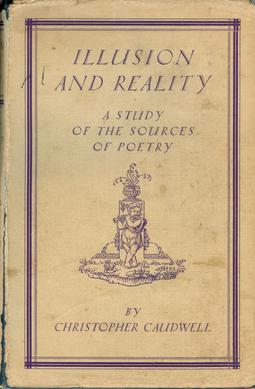Illusion and Reality
Illusion and Reality was written quickly during the summer of 1935, while Caudwell was in the process of a political conversion to Marxism. Portions of the manuscript were produced at a rate of 5,000 words a day.[1] In its use of political theory and history the book was influenced by the philosophy of Karl Marx, but it also was strongly indebted to the literary criticism of I. A. Richards.[2]
Caudwell develops two main arguments in Illusion and Reality. First, each unique era of British poetry (The Romantic Period, The Age of Pope, etc.) develops from a particular economic arrangement in bourgeois society. Caudwell writes:
"When we use the word 'modern' in a general sense, we use it to describe a whole complex of culture which developed in Europe and spread beyond it from the fifteenth century to the present day. There is something 'modern' in Shakespeare, Galileo, Michael Angelo [sic], Pope, Goethe and Voltaire which we can distinguish from Homer, Thales, Chaucer and Beowulf, and compare with Valery, Cézanne, James Joyce, Bergson and Einstein. This complex itself is changeful—no epoch of human history has been so variegated and dynamic as that from the Elizabethan age to ours. But then, the economic foundations too have changed, from feudal to 'industrial'. This culture complex is the superstructure of the bourgeois revolution in production—a revolution whose nature was first analyzed completely by Marx in Das Kapital. Modern poetry is capitalist poetry.[3]
Caudwell, here, is working within the Marxist framework of base and superstructure and argues that both the poetic form and the content are determined by the economic base. To further illustrate this point Illusion and Reality includes a table that outlines the "General Characteristics" of the capitalist economy in Great Britain during ten different eras and their related bourgeois poetic forms, or "Technical Characteristics," from that same period. For example, Caudwell writes:
General Characteristics Technical Characteristics
The Era of Mercantilism and Manufacture, 1688–1750 The Eighteenth Century.--Pope The shortage of labour makes the bourgeoisie continue to ally itself with the agricultural capitalist (the Whig "aristocrat") in order to maintain the laws and restrictions which will keep down the price of labour through the stage of manufacture. Poetry reflects a belief in the rightness and permanence of forms and restrictions, good taste and upper-class "tone". The outward "rules" are now accepted, not as a compromise but as obvious and rational ingredients of style, measure, polish and the antithesis which restrains natural luxuriance. Vocabulary becomes formalised and elegantly fashionable.[4]
The table provides an outline for the historical progression of forms that Caudwell examines in Illusion and Reality and exemplifies the connection Caudwell sees between poetry and economic social relations.
Caudwell's second major claim is that the act of creating poetry is a response by human instincts to the unfavorable conditions of bourgeois life. In this argument, Caudwell modifies the Freudian understanding of the creative process through Marx.
Talent is very good writing